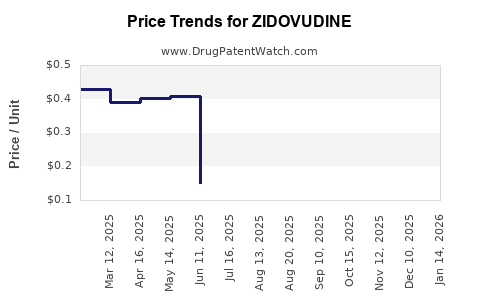ZIDOVUDINE - Generic Drug Details
✉ Email this page to a colleague
What are the generic sources for zidovudine and what is the scope of patent protection?
Zidovudine
is the generic ingredient in two branded drugs marketed by Viiv Hlthcare, Aurobindo Pharma Ltd, Cipla Ltd, Am Regent, Liaoning Chengda, Aurobindo, Aurobindo Pharma, Cipla, Hec Pharm, Hetero Labs Ltd Iii, Hikma, Pharmobedient, and Ranbaxy Labs Ltd, and is included in nineteen NDAs. Additional information is available in the individual branded drug profile pages.There are twenty-two drug master file entries for zidovudine. Three suppliers are listed for this compound. There is one tentative approval for this compound.
Summary for ZIDOVUDINE
| US Patents: | 0 |
| Tradenames: | 2 |
| Applicants: | 13 |
| NDAs: | 19 |
| Drug Master File Entries: | 22 |
| Finished Product Suppliers / Packagers: | 3 |
| Raw Ingredient (Bulk) Api Vendors: | 102 |
| Clinical Trials: | 524 |
| Drug Prices: | Drug price trends for ZIDOVUDINE |
| What excipients (inactive ingredients) are in ZIDOVUDINE? | ZIDOVUDINE excipients list |
| DailyMed Link: | ZIDOVUDINE at DailyMed |
Recent Clinical Trials for ZIDOVUDINE
Identify potential brand extensions & 505(b)(2) entrants
| Sponsor | Phase |
|---|---|
| Michelle Abou-Jaoude | Phase 1 |
| Inflammasome Therapeutics | Phase 1 |
| The Aurum Institute NPC | Phase 1/Phase 2 |
Generic filers with tentative approvals for ZIDOVUDINE
| Applicant | Application No. | Strength | Dosage Form |
| ⤷ Get Started Free | ⤷ Get Started Free | 100MG | CAPSULE; ORAL |
The 'tentative' approval signifies that the product meets all FDA standards for marketing, and, but for the patents / regulatory protections, it would approved.
Pharmacology for ZIDOVUDINE
| Drug Class | Human Immunodeficiency Virus Nucleoside Analog Reverse Transcriptase Inhibitor |
| Mechanism of Action | Nucleoside Reverse Transcriptase Inhibitors |
Medical Subject Heading (MeSH) Categories for ZIDOVUDINE
Anatomical Therapeutic Chemical (ATC) Classes for ZIDOVUDINE
US Patents and Regulatory Information for ZIDOVUDINE
Expired US Patents for ZIDOVUDINE
| Applicant | Tradename | Generic Name | Dosage | NDA | Approval Date | Patent No. | Patent Expiration |
|---|---|---|---|---|---|---|---|
| Viiv Hlthcare | RETROVIR | zidovudine | TABLET;ORAL | 020518-001 | Dec 19, 1995 | ⤷ Get Started Free | ⤷ Get Started Free |
| Viiv Hlthcare | RETROVIR | zidovudine | TABLET;ORAL | 020518-001 | Dec 19, 1995 | ⤷ Get Started Free | ⤷ Get Started Free |
| Viiv Hlthcare | RETROVIR | zidovudine | INJECTABLE;INJECTION | 019951-001 | Feb 2, 1990 | ⤷ Get Started Free | ⤷ Get Started Free |
| Viiv Hlthcare | RETROVIR | zidovudine | TABLET;ORAL | 020518-002 | Oct 4, 1996 | ⤷ Get Started Free | ⤷ Get Started Free |
| Viiv Hlthcare | RETROVIR | zidovudine | TABLET;ORAL | 020518-001 | Dec 19, 1995 | ⤷ Get Started Free | ⤷ Get Started Free |
| Viiv Hlthcare | RETROVIR | zidovudine | SOLUTION;ORAL | 019910-001 | Sep 28, 1989 | ⤷ Get Started Free | ⤷ Get Started Free |
| Viiv Hlthcare | RETROVIR | zidovudine | CAPSULE;ORAL | 019655-001 | Mar 19, 1987 | ⤷ Get Started Free | ⤷ Get Started Free |
| >Applicant | >Tradename | >Generic Name | >Dosage | >NDA | >Approval Date | >Patent No. | >Patent Expiration |
Market Dynamics and Financial Trajectory for the Pharmaceutical Drug: Zidovudine
More… ↓
Make Better Decisions: Try a trial or see plans & pricing
Drugs may be covered by multiple patents or regulatory protections. All trademarks and applicant names are the property of their respective owners or licensors. Although great care is taken in the proper and correct provision of this service, thinkBiotech LLC does not accept any responsibility for possible consequences of errors or omissions in the provided data. The data presented herein is for information purposes only. There is no warranty that the data contained herein is error free. We do not provide individual investment advice. This service is not registered with any financial regulatory agency. The information we publish is educational only and based on our opinions plus our models. By using DrugPatentWatch you acknowledge that we do not provide personalized recommendations or advice. thinkBiotech performs no independent verification of facts as provided by public sources nor are attempts made to provide legal or investing advice. Any reliance on data provided herein is done solely at the discretion of the user. Users of this service are advised to seek professional advice and independent confirmation before considering acting on any of the provided information. thinkBiotech LLC reserves the right to amend, extend or withdraw any part or all of the offered service without notice.

